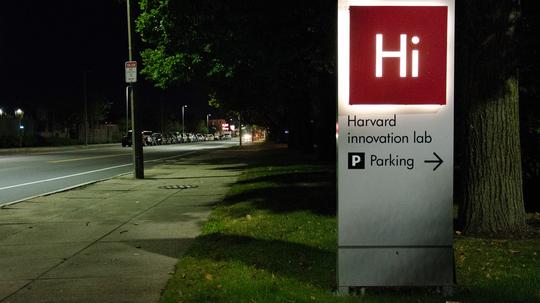
When the Harvard Innovation Lab opened its doors in November 2011, Facebook Founder Mark Zuckerberg visited. And when he did, a sophomore studying computer science said, "One of the reasons I came to Harvard was because of Mark Zuckerberg."
Dozens of other students strolling through the Cambridge campus would likely regurgitate a similar statement. Ask administrators about the now-billionaire, and they might admit they should have paid closer attention to his former professor Harry Lewis, a fixture in the School of Engineering and Applied Sciences. Who knows, had the process of starting a company been easier, Zuckerberg could have stayed in Boston.
But he didn't, and it's time to stop thinking of him as the one that got away. There's more to Harvard than Mark Zuckerberg.
Former Boston City Councilor Mike Ross published an editorial in the Boston Globe Wednesday, entitled, "Harvard's Startup Lab Targets Millennials." The introduction read:
The Harvard Innovation Lab came too late to keep Facebook from moving to Palo Alto. But today it sits on the edge of the Harvard Business School in Allston waiting to snare the next Zuckerberg. Since being launched in 2011, it’s still waiting.
The article goes on to address BriefMe, a news aggregation app whose success, according to Ross, will, "depend on whether millennials will choose to digest the news of the world, instead of entertainment stories about Justin Bieber."
Ross sounds skeptical the startup can tackle popular culture; BriefMe Co-founder Max Campion is confident they can appeal to a younger demographic; either way, the rest of the article is riddled with sweeping generalizations.
One startup does not the i-lab make. Eighty-four startups spent 12 weeks incubating out of the space just this summer. Come Demo Day in mid-August, 10 teams were taking to the stage to present and none were swapping social media stories. Instead, they were talking about improving HIV patient care with better, faster and cheaper diagnostic tools, or about how they were building the first community shared solar installation for Cambridge- and Boston-area residents.
This isn't saying anything negative about BriefMe, this is just a reminder that Harvard is more than social networking platforms.
The i-lab offers dozens of evening workshops and seminars, as well as one-on-one office hours with roughly 50 "Experts-in-Residence" and four partner law firms. Perks aren't just offered to students, however; the i-lab has opened its doors to the Boston tech community, and for more than just events. When the Startup Institute launched two years ago, its inaugural class congregated in Allston.
"We're not putting a moat up around this," said the i-lab's Managing Director Gordon Jones in a previous interview.
Ross also wrote:
So far, the two most promising startups to come out of the i-lab are Handybook (now Handy), which books house cleanings as easily as Uber does a taxi, and Plastiq, which enables credit card payments for items once unavailable, such as college tuition and utilities.
Handy has certainly seen success. The company has raised $45.7 million to date and expanded abroad. At the same time, Handy has also moved its headquarters to New York City.
In July, Plastiq announced it raised $10 million in Series B funding, but that the startup would be relocating from Boston to San Francisco.
Ross didn't appear to take these local success stories into account:
- Vaxess, a Cambridge-based life sciences company developing a heat-stable vaccine formulation that would eliminate the need to refrigerate vaccines, thereby reaching vaccines' global reach and accessibility. The startup took home $25,000 from Harvard Business School’s 2012 New Venture Competition, another $70,000 from Harvard’s inaugural President’s Challenge and, within a year, another $50,000 from Harvard Business School’s alumni business plan competition. If that wasn't enough, Vaxess closed the first tranche of a $3.75 million Series A in May 2013.
- RallyPoint, a Watertown-based "LinkedIn for the military" has raised $7 million to date, all while helping military professionals advance in their careers.
- Philo, formerly known as Tivli, a Cambridge-based startup, also started out of a Harvard dorm room, focused on offering a seamless service that brings live television content to devices that students actually use to consume media: smartphones, tablets and laptops. Philo raised $3.6 million in June 2013 from the likes of New Enterprise Associates and Mark Cuban’s Radical Investments.
And those are just three of many. Roughly 500 unique startups have come in and out of the i-lab — several comprised of students from every school within Harvard. How can Ross then generally state, "Harvard's startup lab targets millennials?"
Given millennials are stereotypically "lazy," maybe Ross was trying to target millennials himself with a rather lazy argument.
Image via Flickr User Tim Pierce (CC BY 2.0)








